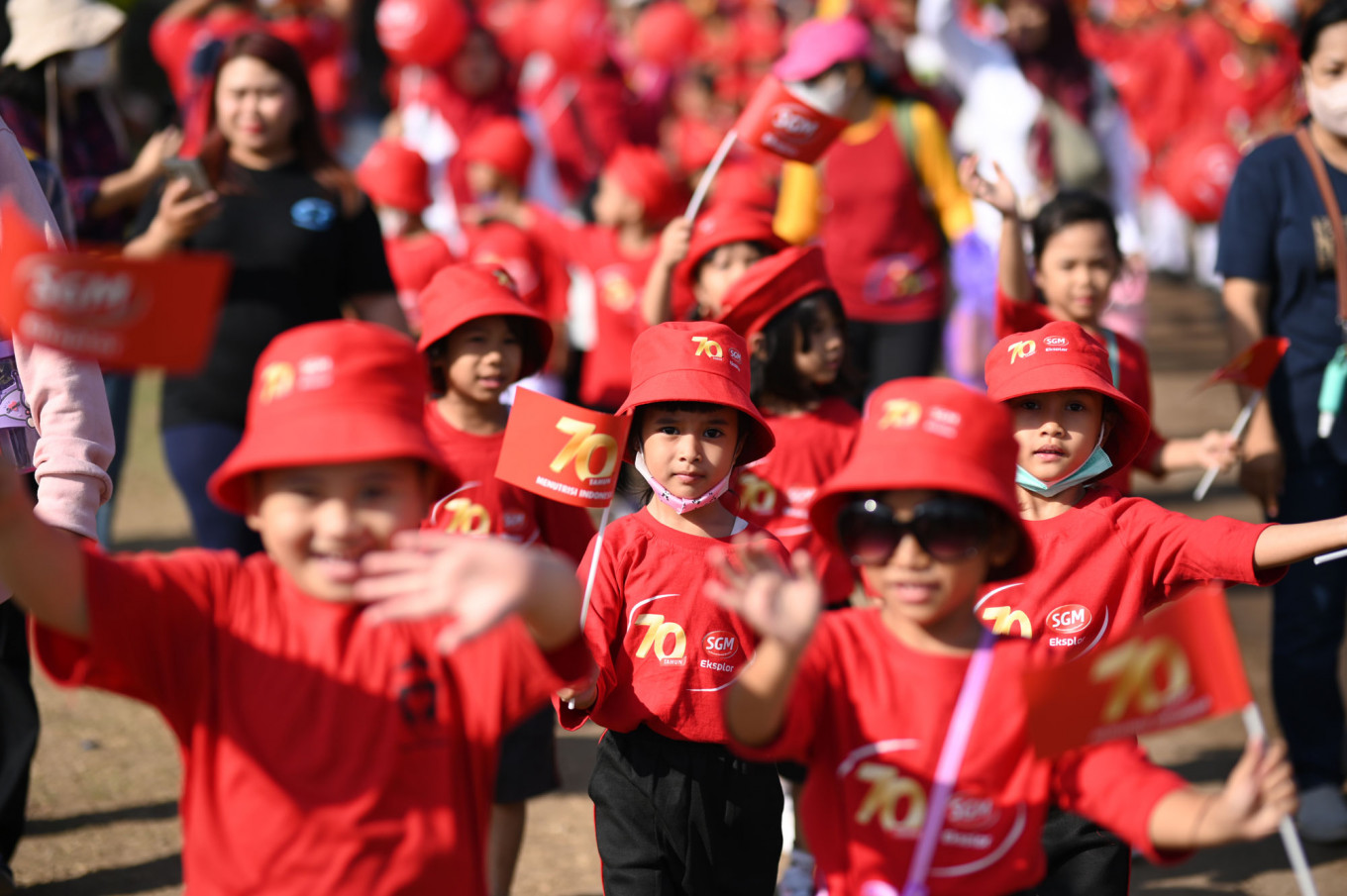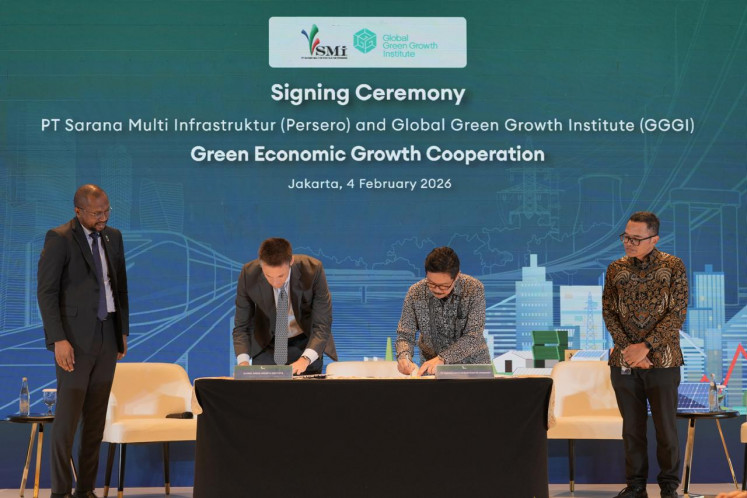Popular Reads
Top Results
Can't find what you're looking for?
View all search resultsPopular Reads
Top Results
Can't find what you're looking for?
View all search resultsNourishing a nation: Danone’s legacy in advancing public health in Indonesia
From early childhood nutrition to sustainable community programs, Danone Indonesia continues to shape a healthier future for generations
Change text size
Gift Premium Articles
to Anyone
L
ast March, Indonesia and France commemorated the 75th anniversary of their diplomatic relations, a milestone in a partnership rooted in shared values and mutual interests. Marking this historic occasion was the official state visit of French President Emmanuel Macron to Indonesia, which underscored the deepening ties between the two nations.
As one of the five permanent members of the United Nations Security Council with veto power, and the world’s seventh-largest economy, France continues to serve as a strategic partner for Indonesia. The bilateral relationship spans a wide range of sectors, including trade, defense, climate action and public health and nutrition; areas that are central to Indonesia’s national development agenda.
Danone: A global leader rooted in local commitment
Globally recognized as the leader in dairy and plant-based products and second in both packaged water and early life nutrition, Danone has consistently demonstrated its commitment to “bringing health through food to as many people as possible”. In Indonesia, this mission aligns closely with the government’s efforts to improve public health and advance its Golden Indonesia 2045 vision, an aspiration to become a developed, sovereign and globally competitive nation by the centenary of its independence.
Danone believes that good health can be achieved through improved nutrition and better daily habits. This belief is reflected in the company’s active support of government-led initiatives to reduce iron deficiency anemia (IDA).
Indonesia is home to more than 70 million children, with recent data indicating that one in five children under five is at risk of anemia or iron deficiency. The 2023 Indonesia Nutritional Status Survey (SKI) further underscores the urgency, reporting a 23.8 percent prevalence of anemia among children under five. If left unaddressed, anemia can lead to long-term consequences, including weakened immunity, heightened susceptibility to infections and an increased risk of stunting, threatening national efforts to cultivate a strong, healthy and productive generation.
Understanding the urgency of this issue, Danone Indonesia, known locally for heritage brands such as Sarihusada since 1954 and AQUA since 1973, has been working on public health initiatives, supporting local communities and contributing to national development for decades. Its collaboration with the Indonesian government represents a scaling-up of its longstanding commitment to supporting health and nutrition at the grassroots level.
Danone Indonesia has partnered with key stakeholders, including national and local governments, academia, NGOs and community-based organizations to roll out a series of nationwide initiatives focused on iron supplementation, anemia screening and public education. These include community programs such as GESID (Healthy Generation of Indonesia), which boasts the participation of 2,500 ambassadors, 2,500 teachers and 42,000 students. There is also the “Isi Piringku” program that has reached over 800 early childhood education centers (PAUD), 2,700 teachers, 34,000 students and 37,000 parents with nutrition workshops that emphasize adequate consumption of iron-rich foods, especially animal-based proteins. And finally, “Warung Anak Sehat” (Healthy Children’s Stall), which is an initiative combining health promotion with economic empowerment, the deployment of iron checkers for early detection, support for the School Health Movement and digital education initiatives, including webinars, educational videos from health experts, practical recipes for iron-rich foods and articles on balanced nutrition.
Laurent Boissier, president director of Danone Indonesia said beyond its core mission of improving public health through nutrition and hydration, Danone Indonesia also emphasizes scientific rigor and innovation in its product development. Backed by a global network of research centers, including Danone Paris-Saclay Research and Innovation Center, Paris; Danone Nutricia Research, Utrecht, Netherlands; and Danone Nutricia Research, Singapore, Danone Indonesia ensures that its offerings are grounded in the latest nutritional science and meet the highest safety and quality standards.
“As a company specializing in maternal and child nutrition, Danone Indonesia puts forward technology that plays a critical role in addressing the first 1,000 days of life, which is a vital window for child development,” said Laurent.
Sustainability at core of Danone Indonesia’s strategy
Delivering health to the community also means protecting the environment. Danone Indonesia operates in line with the Danone Impact Journey, its long-term sustainability roadmap. The company’s environmental actions in Indonesia are anchored in three strategic pillars:
- Reducing Carbon Emissions: As part of the decarbonization journey to meet the 2030 Science-Based Targets initiative (SBTi) and mitigate climate change, Danone Indonesia has reduced its carbon footprint by transitioning to renewable energy sources such as solar panels (8 MWp-solar PV across seven factories and an additional four factories this year), biomass boilers and logistic route optimization through railway transportation.
- Preserving Water Resources: Recognizing water as a shared and finite resource, Danone Indonesia is committed to achieving a positive water impact through a comprehensive water stewardship strategy. This includes watershed preservation initiatives across 10 high-risk watersheds, spanning from upstream to downstream, returning more water to nature and communities, as well as regenerative agriculture, community access to clean water and sanitation (WASH) and water efficiency programs through the 4R approach (reduce, reuse, recycle, reclaim).
- Optimizing Packaging and Promoting Waste Collection: Danone Indonesia, through the #BijakBerplastik movement is committed to addressing plastic waste issues by promoting innovative collaboration and action. The company has improved plastic collection and recycling rates, facilitating the collection of over 26,000 tonnes of plastic waste annually. Through its Recycling Business Unit (RBU), Danone has empowered 25,000 waste pickers by professionalizing the informal recycling sector. These efforts are further supported by the “My Waste, My Responsibility” (Sampahku Tanggung Jawabku/ SAMTAKU) campaign, which has reached more than 3.8 million children and 100 million consumers, as well as packaging innovations that promote reusable packaging and reduce the use of virgin PET and unnecessary plastics.
In addition to its commitment to environmental stewardship, Danone Indonesia plays an active role in advancing local development through a range of community empowerment initiatives aimed at increasing household incomes, promoting women’s entrepreneurship and improving access to health services. Vera Galuh Sugijanto, VP general secretary of Danone Indonesia said with a presence in Indonesia spanning over 70 years, Danone Indonesia now employs 11,000 people and operates 24 factories nationwide making it a contributor to the national economy.
Around its manufacturing sites, the company has supported community groups, helping to improve livelihoods and boost the production of local commodities. Since 1991, the company has also empowered smallholder farmers and dairy cooperatives to enhance productivity and contribute to increased local fresh milk supply, thereby supporting better protein intake for Indonesian children. Today, Danone partners with more than 500 farmers and six dairy cooperatives across two regions, absorbing over 6 million liters of fresh milk annually.
Danone’s commitment to entrepreneurship is reflected in the Damping UMKM program, which has benefited more than 8,300 recipients and more than 3,300 small and medium enterprises (SMEs) from across Indonesia through training, coaching and knowledge-sharing initiatives. In parallel, the AQUA Home Service (AHS) has empowered around 15,000 partners across Indonesia to earn additional income by selling AQUA products from home, supported by financial literacy workshops and micro-business management training.
Danone Indonesia upholds a strong commitment to employee health and development through holistic programs that go beyond compliance. Its “BeWell” initiative promotes physical, mental and nutritional wellness, while comprehensive healthcare coverage extends to employees and their families. As a family-first employer, Danone offers inclusive parental benefits, including six months of maternity leave, 10 days of paternity leave, coverage for childbirth and fertility treatments and prenatal checkups without using annual leave. Fully equipped lactation rooms support breastfeeding mothers across all sites.
“Through its collaborative, science-based, and community-centered approach, Danone Indonesia continues to contribute meaningfully to Indonesia’s development agenda. From reducing childhood anemia to supporting inclusive economic growth and environmental sustainability, the company’s initiatives align closely with the national vision of building a healthier and more prosperous Golden Indonesia 2045,” concluded Vera.
Source: Danone











